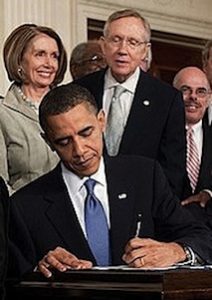 In a recent New York Times article, “For Obamacare to Work, Everyone Must Be In,” Robert H. Frank observes that for insurance companies to offer coverage at the same rate to everyone, including those with “pre-existing conditions,” they would have to charge higher premiums, which would induce healthier people to drop coverage, driving the premiums still higher, and so on. This so-called “adverse-selection problem,” Frank claims, constitutes a failure of the free market and demonstrates the need for further government regulation of insurance companies.
In a recent New York Times article, “For Obamacare to Work, Everyone Must Be In,” Robert H. Frank observes that for insurance companies to offer coverage at the same rate to everyone, including those with “pre-existing conditions,” they would have to charge higher premiums, which would induce healthier people to drop coverage, driving the premiums still higher, and so on. This so-called “adverse-selection problem,” Frank claims, constitutes a failure of the free market and demonstrates the need for further government regulation of insurance companies.
But the premise that insurance companies should cover everyone at the same rate is false, and forcing insurance companies to cover everyone at the same rate is immoral and thus impractical.
Insurance is a product that certain businesses produce for trade and profit. Insurance companies price their product by assessing risks and accounting for many variables involving the market and their customers. Insurance companies and their customers (properly) deal with each other voluntarily, by mutual consent to mutual advantage. Insurance, properly speaking, is a kind of voluntary contract.
The coverage for “pre-existing conditions” that insurers are forced to provide is, strictly speaking, not insurance at all.
The “adverse-selection problem” that Frank describes would never arise in a free, voluntary market because when buyers and sellers are free to negotiate prices, they don’t select “adversely”; rather, they select selfishly—each contracting as he thinks is in his best interest. (Of course, they don’t have to select selfishly, but they are both free and have incentive to do so.)
 In a free market, the facts of reality provide people with incentive to obtain whatever kind and degree of insurance is in their best interest given their personal circumstances—including any “pre-existing conditions” they might have.
In a free market, the facts of reality provide people with incentive to obtain whatever kind and degree of insurance is in their best interest given their personal circumstances—including any “pre-existing conditions” they might have.
Who pays for insurance in a free market? Each person pays for whatever (available) insurance he deems appropriate to his needs and can afford. An individual’s pre-existing conditions are his pre-existing conditions, and, if he wants them covered, then it is his (or, in the case of a child, his legal guardian’s) moral responsibility to pay for the insurance.
At the end of his article, Frank offers a challenge: “We must ask those who would repeal Obamacare how they propose to solve the “adverse-selection problem.” The answer is to establish a free market in health insurance by restricting the government to protecting (and not violating) the rights of insurance companies and their customers to voluntarily negotiate the terms of their contracts.
In short, the solution to the “adverse-selection problem” is the selfish-selection alternative—which comes only with a free market in health insurance.
Like this post? Join our mailing list to receive our weekly digest. And for in-depth commentary from an Objectivist perspective, subscribe to our quarterly journal, The Objective Standard.
Related:
- ObamaCare v. the Constitution
- A Prescription for America’s Health Care Ills
- Moral Health Care vs. “Universal Health Care”
Image: Wikimedia Commons


![[TEST] The Objective Standard](https://test.theobjectivestandard.com/wp-content/uploads/2017/10/logo.png)










